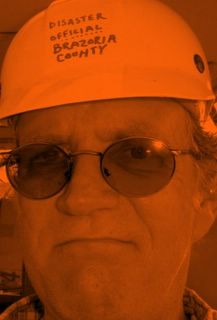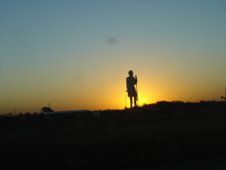Thompson called wife before suicide
 Hunter Thompson asked his son to leave him alone in the kitchen before he shot himself in the mouth. He also called his wife.
Hunter Thompson asked his son to leave him alone in the kitchen before he shot himself in the mouth. He also called his wife.
A friend, Louisa Davidson, said he was a prisoner of his own lifestyle.
She said Thompson had been depressed, talked about suicide and "was a prisoner of his lifestyle."
Davidson once partied with Thompson and his friends, but said she has been sober for two years. She said she hopes a message can be gleaned from Thompson's suicide.
"The party is over," said Davidson.
"Maybe for people he had the coolest life ever," she said. "Our generation is so full of addicts. This valley glorified this lifestyle."
After Ernest Hemingway killed himself, Thompson went to Ketchum, Idaho, to write a story.[Rocky Mountain News]
Historian Douglas Brinkley is editing the third volume of Thompson's correspondence and plans to continue the project. The writer himself was "the best character he created."[USA Today]
Tom Wolfe recollects some memorable dining moments with Thompson, including their first lunch at a New York City restaurant where Thompson pulled a marine distress signal from a paper bag and let it rip.
Wolfe also recalls an incident in Scotland.
In the summer of 1988 I happened to be at the Edinburgh Festival in Scotland one afternoon when an agitated but otherwise dignified, silver-haired old Scotsman came up to me and said, "I understand you're a friend of the American writer Hunter Thompson."
I said yes.
"By God -- your Mr. Thompson is supposed to deliver a lecture at the Festival this evening -- and I've just received a telephone call from him saying he's in Kennedy Airport and has run into an old friend. What's wrong with this man? He's run into an old friend? There's no possible way he can get here by this evening!"
"Sir," I said, "when you book Hunter Thompson for a lecture, you have to realize it's not actually going too be a lecture. It's an event -- and I'm afraid you've just had yours."
Wolfe calls Thompson the 20th Century's greatest comedy writer in the English language, following the tradition of Mark Twain.[WSJ]
Thompson's lawyer says writer left hints that now make sense, leaving instructions that he didn't want his papers sold off piecemeal. Thompson's estate is worth millions. [Boston Globe]
Thompson wants a church funeral and his cremains to be shot out of a cannon. [Newsday]
Mark Twain's biographer, Justin Kaplan, says Thompson shook up journalism.
"Thompson was always going against the conventional, in thinking and writing and journalism...There was something distinctly and proudly subversive about him, as there was about Mark Twain, and we certainly need people like that."[SF Chronicle]
...He said the Hunter Thompsons of the world are few and far between in today's journalism, a business that "doesn't seem to have a hell of a lot of backbone these days. It's corporate journalism that doesn't encourage this kind of oppositional or satirical writing."
Jerry Jeff Walker named his band "The Lost Gonzos" in honor of Thompson.
...in honor of old friend Hunter S. Thompson, I nicknamed the band the Lost Gonzos.
I had become a fan of Hunter’s writing, and Rosalee Sorrells once told me, "You need to visit my friend Hunter in Woody Creek, Colorado. He loves Wild Turkey, too."
So I did, and we spent a couple of nights roaring our tits off around Aspen and wound up singing in his living room to his peacocks.
I decided that what the band and I were doing musically, he was doing in his books. That night at his house we discussed Gonzo-ism: "Taking an unknown thing to an unknown place for a known purpose." (mid-1970s)
(From "Gypsy Songman," by Jerry Jeff Walker (Woodford Press, 1999))
Robert Sam Anson describes Thompson at party hosted by Rolling Stone editor Jan Wenner.
...past midnight, in a townhouse on New York’s fashionable East Side, a rock magazine publisher [Rolling Stone’s Jann Wenner] is hosting a party for his staff...[Salon.com]
The hour is late...he is doing his best to get drunk. Standing off in a corner, trademark shades in place, stoned as usual, he looks oddly depressed. This is not his kind of crowd. Everyone appears to be over thirty. They are wearing suits and ties. None of them is stoned. And they are all so calm. That is the real problem: none of them is crazy. They wouldn’t understand the demons that live in his head. He drains his glass in a gulp and orders another drink. And then another. Buy the end of the evening, he will have had many drinks, and will still be sober. It is his special curse: to be able to fill his body with alcohol and drugs, and always have it function; never to be able to blot out what he has seen, what he knows. And looking around, he knows that it is over: the revolution, the fighting, the chance to be different. The counterculture has become The Culture, and out there in the streets is the proof.... (1976)
(From "Gone Crazy and Back Again: The Rise and Fall of the Rolling Stone Generation," by Robert Sam Anson (Doubleday, 1981))














No comments:
Post a Comment